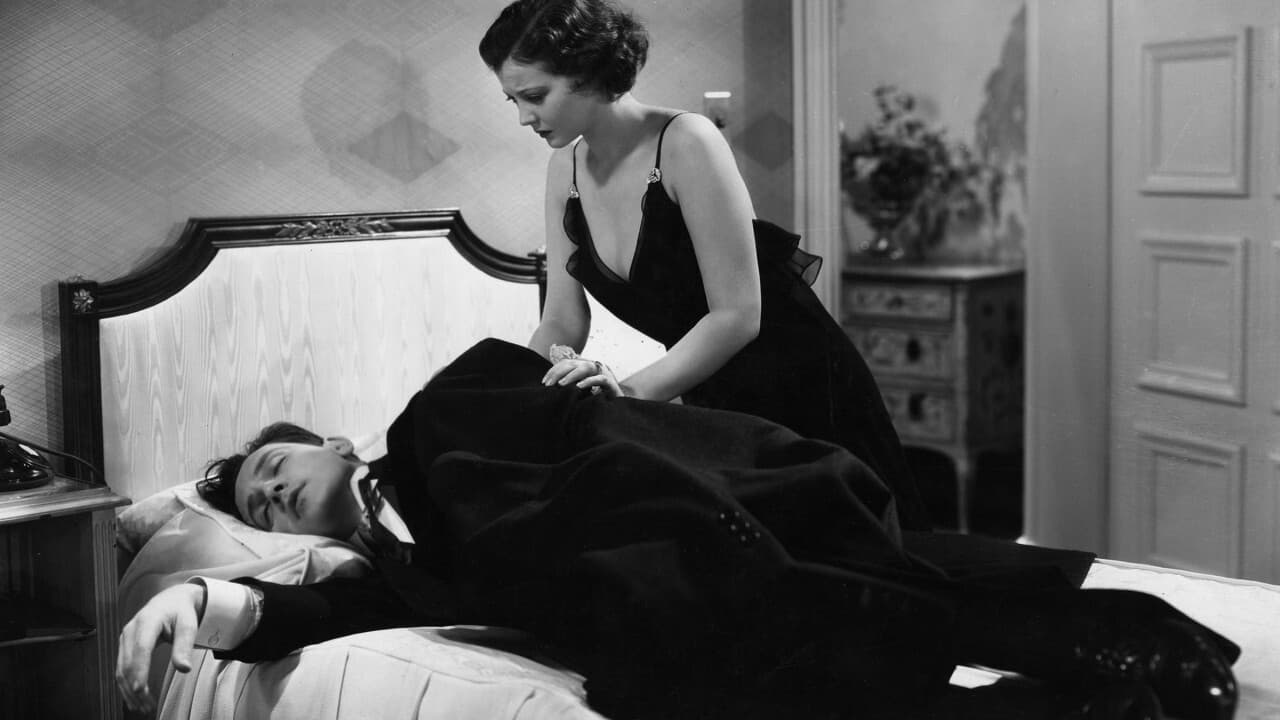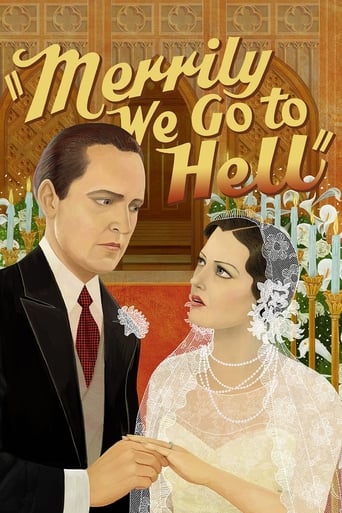

Best movie of this year hands down!
... View MoreVery disappointed :(
... View MoreSadly Over-hyped
... View MoreBad Acting and worse Bad Screenplay
... View More....most of all, the somber ending - very rare for a 1930s movie. The production is A-class; Dorothy Arzner's direction is smooth; Sylvia Sidney looks exceptionally beautiful; and the script is thin but sophisticated: for example, when Sidney complains to March near the end of the movie that he has never told her that he loves her, you realize that it's true. *** out of 4.
... View MoreMerrily We Go to Hell (1932)** 1/2 (out of 4) Reporter Jerry Colbert (Fredric March) is in a drunken state when he meets the beautiful Joan (Sylvia Sidney) who just happens to be the daughter of a millionaire. The two hit it off but before long Joan realizes that Jerry has a major issue with alcohol. At first her love is enough to keep him away from the drink but before long he's back on the bottle.MERRILY WE GO TO HELL has one of the greatest titles of any movie in history but sadly the film itself isn't all that great or even good for that matter. This here is another Pre-code that manages to have some good performances that go wasted on a story that just isn't all that interested. What's worse is the fact that the story is pretty darn predictable from start to finish without any real surprises or fresh moments.The best thing going for the film are the performances. March, fresh off his Best Actor Oscar win for DR. JEKYLL AND MR. HYDE, offers up a good performance in the role of a drunk who can't help but want to party more than stay with his wife. Adrianne Allen plays his former lover and she offers up a fine performance. George Irving has some excellent moments playing Sidney's father. You've even got an early performance from Cary Grant. As far as Sidney goes, she's certainly the best thing about the film. She handles the dramatic moments perfectly but the greatest part comes at the start of the picture with that bubbly personality, which makes you understand why an alcoholic would give up the bottle for her.This here was years before THE LOST WEEKEND so the subject of alcoholism isn't really dealt with in a strong or graphic way. More than anything we just see the March character as either having too much fun or passing out during moments that he's needed. As it stands, MERRILY WE GO TO HELL might appeal to fans of the cast but the film itself has quite a few problems.
... View MoreThis is a movie that has a lot to say about 'modern' relationships, drinking, and feminism of the time. And for the most part the execution is very good.Merrily We Go to Hell is an extremely well acted film, but that to me is not the highlight of the movie. It's the writing with realistic characters and funny moments that are the best part of it. It is one of the better performances I've seen from Sylvia Sidney, which is a little odd as its one of her earliest.Fredric March stars as a man who doesn't deserve the love of a rich girl that has fallen for him. He's frequently drunk (the title of the film is his favorite drinking toast) and disappoints her at nearly every turn. It's hard to understand exactly what Joan (Sidney) likes about him so much. But that's the way love is sometimes. Joan takes the good with the bad and always seems to forgive the bad, no matter how appalling. Jerry (March) is still getting over his last relationship, attempting to drink it off.One moment in that part of the story was a highlight for me, where Jerry mentions his previous girlfriend. Joan asks if he has a picture of her, and he responds by saying he has one hidden away somewhere that he looks at once in a blue moon when he's feeling lonely. The movie immediately cuts to him arriving home and the picture of the girl he was mentioning is framed on the wall, with a personal note written to him on it. A clear omen for things to come.Merrily We Go to Hell does a fabulous job showing the dark side of drinking, something movies of the time rarely did. As the overall weakness of Jerry and Joan's relationship becomes unraveled, it takes Joan just a little longer than it seems like it should to finally get the courage to leave him. This is very much a sign of the times Depression-era picture. Showing the underlying unhappiness in the lives of socialites.If you are are a Carey Grant fan, he is essentially a pawn in the relationship game. As Jerry seems to be falling for his ex, the star of his new play, Joan attempts to give him a taste of his own medicine by going out with the other star of his play (Grant). Grant has maybe 4 or 5 lines.My only major criticism of the movie is the ending. I know it was a written rule in Hollywood at the time for movies to have a happy ending, but I don't consider the two of them getting back together a happy ending. Joan was right to leave him and she never should have taken him back. She was better off without him. Ending on the scene where she leaves would have been a better ending climatically, as well as been a happier ending. But in the time period that ending would not have been possible.
... View More***SPOILERS*** ***SPOILERS*** MERRILY WE GO TO HELL (Paramount, 1932), directed by Dorothy Arzner, is not a horror movie about Satan worshipers who hold Black Masses in Transylvania, as the title may indicate, but is a story about an heiress names Joan Prentiss (Sylvia Sidney) who meets Jerry Corbett (Fredric March), a drunken newspaperman, on the rooftop during a party. Jerry's ambition is to become a successful playwright. Within a short time he falls in love with Joan, but Joan's father (George Irving) disapproves of Jerry because of his careless ways. He offers to buy Jerry out of marrying his daughter, but refuses to accept the $50,000. Quite happy that Jerry's sole interest is in his daughter, he gleefully approves of the upcoming marriage. During the wedding ceremony, Jerry, somewhat drunk, forgets the wedding ring and finds himself in an embarrassing situation by placing a beer tap on Joan's finger. Time passes. Jerry writes the comedy play, "When Women Say No," and it gets produced. The leading lady turns out to be Claire Hempstead (Adrienne Ames), Jerry's former girlfriend. While the play proves successful, Jerry's married life is not, especially when Joan finds he's spending more time with Claire as well with the booze. Not wanting to be an old-fashioned wife, Joan decides not to let this bother her by dating Charlie Baxter (Cary Grant), the leading man of the play, to society functions. Disgusted, Joan finally does leaves Jerry without telling him she's pregnant with his child. Old Man Prentiss tries his best to keep Jerry from visiting Joan in the hospital, where she's in danger of possibly losing either her life or baby.The title, MERRILY WE GO TO HELL, happens to be the catch phrase used by March several times in the story before taking a drink. The movie in itself is forgotten with a familiar plot quite common during the Depression era. Film titles using "Hell" in it were also quite common practice during that time, until the production code people stepped in and put a stop to that, for the time being anyway. This romancer may be of some interest to film buffs today, especially seeing it being an early screen appearance by Cary Grant, in his third featured role. He is first seen (in long shot) wearing period costume and wig in Jerry's stage play opposite Adrienne Ames, and later at a social function in dinner clothes after the play's opening, before his character disappears. Sylvia Sidney does what she does best playing a long suffering girl, a kind of role she played from time to time, possibly because of her sweet and tender face. Before the end of 1932, Grant would elevate to becoming Sidney's co-star in one of her most tender movie roles, MADAME BUTTERFLY.Also featured the cast of MERRILY WE GO TO HELL is Richard "Skeets" Gallagher as Buck, Jerry's reporter friend with a talent for tap-dancing, adding some amusing support during the film's serious moments; Kent Taylor as Gregory; and Florence Britton as Charlcie. Background music score includes "What a Little Thing Like a Wedding Ring Can Do" and "We Will Always Be Sweethearts," songs introduced in Paramount's 1932 musical hit, ONE HOUR WITH YOU starring Maurice Chevalier and Jeanette MacDonald.In spite of good actors rising above somewhat average script, it's worth seeing as a curiosity on DVD(double featured with 1931's THE CHEAT). If the story may not be an attention grabber, the title definitely is. (**)
... View More